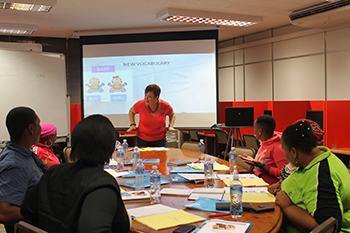Latest News Archive
Please select Category, Year, and then Month to display items
12 January 2024
|
Story Nonsindiswe Qwabe
|
Photo Sonia Small
 Since joining the UFS in 2008, Dr Grey Magaiza has worked extensively on approaches that can foster the socio-economic transformation of societies.
Since joining the UFS in 2008, Dr Grey Magaiza has worked extensively on approaches that can foster the socio-economic transformation of societies.
“The future should be one where communities can decide on their development agenda and futures. That’s the most important for me.” Dr Grey Magaiza, Deputy Director of the Centre for Gender and Africa Studies (CGAS) and Head of the Community Development programme on the Qwaqwa Campus, is passionate about capacitating communities to be agents of change and advancement. His vision for the future emphasises the empowerment of communities to take charge of their development by actively participating in decision making and the implementation of development projects that can improve their lives.
Since joining the UFS in 2008, Dr Magaiza has worked extensively on approaches that can foster the socio-economic transformation of societies. Over the years, he has crafted his research speciality into one that he is most proud of – being an interdisciplinary scientist immersed in the development of communities.
“I’m in a fortunate position of researching what I like. I say ‘fortunate’, because I’ve taken the time to understand what I’m passionate about, which is the overall field of rural livelihoods and livelihood futures – in short, community development. My research starts from an engaged university, understanding the elements that a university must use to enhance transformation and relevance to its immediate community in terms of development.”
One of the ways he has done this is by looking at social entrepreneurship as a development approach for young people in a rural setting. Through workshops with non-profit and civic organisations in Qwaqwa, Dr Magaiza has been helping these organisations to map out their needs and actively meet them through the involvement and support of external role players.
“We understand that communities are part of the national development agenda, but even that national agenda respects community knowledge and intentions and allows communities to shape their identity. A critical enabler of this is community organising. You bring back the capacity in communities to have dialogues on issues affecting them as spaces for engagement, knowledge exchange, and for people to just talk about their way forward.”
By enabling communities to define their development agenda, they can address their specific needs, challenges, and aspirations, he said. “When I look at livelihood futures, it’s quite an exciting aspect of my work – it’s like looking into a fortune tellers’ globe, because you’re not deciding for communities what they should do, but the communities themselves take those decisions.”
UFS provides sign language skills to locals
2016-02-12

Susan Lombaard teaching at one of the sessions
Photo: Valentino Ndaba |
The public and private sectors are becoming more aware of the need for effective communication between employers, employees, and clients who use Sign Language. Given that Sign Language is the first language of approximately 600 000 people in South Africa, competence in the language means taking the first step towards more inclusive service delivery.
Shout Out Loud - a project that promotes Sign Language - has signed up Bloemfontein Celtics, Centlec, Beyond Boundaries, and the Mangaung Municipality on a Basic South African Sign Language course at the University of the Free State.
No miscommunication
Susan Lombaard, the Acting Head at the Department of South African Sign Language, was one of the lecturers who presented the 40-hour accredited course every Friday from 15 January-12 February 2016. Other lecturers who were responsible for training were Emily Matabane and Tshisikhawe Dzhivani.
Lombaard believes that learning Sign Language bridges the gap between the hearing and those who have impairments. “The benefit is that there will be no miscommunication. It happens that a deaf person walks into a bank or municipality offices and there is no communication. They need to write which is humiliating for that person.”
Towards a promising future
According to Goodwill Mokoena, Project Manager at Beyond Boundaries, the project will continue annually, and a larger intake of government departments and non-governmental organisations is expected in 2016.He also indicated that Shout Out Loud has achieved substantial success in its involvement with the Bartimea School for the Blind and Deaf.
Shout Out Loud selects one pupil every month, and flies them to Johannesburg to interpret on Bloemfontein Celtics’ magazine show. It is the only magazine show in South Africa that has a sign language interpreter. “The school has been achieving 100% in matric results because the pupils are selected on merit. This has enhanced their academic performance in such a marvelous way,” said Mokoena.